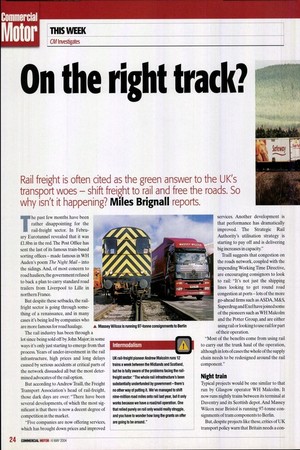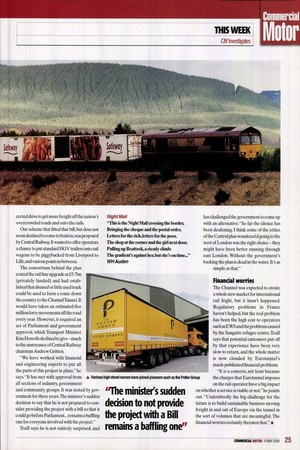On the right Rail freight is often cited as the
Page 24

Page 25

If you've noticed an error in this article please click here to report it so we can fix it.
green answer to the UK's transport woes — shift freight to rail and free the roads. So
why isn't it happening? Miles Brignall reports.
The past few months have been rather disappointing for the rail-freight sector. In February Eurotunnel revealed that it was £1.8bn in the red. The Post Office has sent the last of its famous train-based sorting offices — made famous in WH Auden's poem The Night Mail — into the sidings. And, of most concern to road hauliers, the government refused to back a plan to carry standard road trailers from Liverpool to Lille in northern France.
But despite these setbacks, the railfright sector is going through something of a renaissance, and in many cases it's being led by companies who are more famous for road haulage. The rail industry has been through a
lot since being sold off by John Major; in some ways it's only just starting to emerge from that process. Years of under-investment in the rail infrastructure, high prices and long delays caused by serious accidents at critical parts of the network dissuaded all but the most determined advocates of the rail option.
But according to Andrew Trail, the Freight Transport Association's head of rail-freight, those dark days are over: "There have been several developments, of which the most significant is that there is now a decent degree of competition in the market. "Five companies are now offering services, which has brought down prices and improved services. Another development is that performance has dramatically improved. The Strategic Rail Authority's utilisation strategy is starting to pay off and is delivering big increases in capacity" Trail suggests that congestion on the roads network, coupled with the impending Working Time Directive, are encouraging consignors to look to rail: "It's not just the shipping lines looking to get round road congestion at ports — lots of the more go-ahead firms such as ASDA,M&S, Superdrug and Exel have joined some of the pioneers such as WH Malcolm and the Potter Group, and are either using rail or looking to use rail for part
of their operation.
"Most of the benefits come from using rail to carry out the trunk haul of the operation, although in lots of cases the whole of the supply chain needs to be redesigned around the rail component." Night train
Typical projects would be one similar to that run by Glasgow operator WH Malcolm. It now runs nightly trains between its terminal at Daventry and its Scottish depot. And Massey Wilcox near Bristol is running 97-tonne consignments of tram components to Berlin. But, despite projects like these, critics of UK transport policy warn that Britain needs a con
certed drive to get more freight off the nation's overcrowded roads and onto the rails. One scheme that fitted that bill, but does not seem destined to come to fruition,was proposed
by Central Railway. It wanted to offer operators a chance to put standard HGV trailers onto rail wagons to be piggybacked from Liverpool to Lille, and various points in between.
The consortium behind the plan costed the rail line upgrade at £5.7bn (privately funded) and had established that disused or little used track could be used to form a route down the country to the Channel Tunnel. It would have taken an estimated five million lorry movements off the road every year. However, it required an act of Parliament and government approval, which Transport Minister Kim Howells declined to give —much to the annoyance of Central Railway chairman Andrew Gritten. "We have worked with financial and engineering experts to put all the parts of this project in place," he says. "It has met with approval from all sections of industry, government
and community groups. It was tested by government for three years. The minister's sudden decision to say that he is not prepared to consider providing the project with a bill so that it could go before Parliament... remains a baffling one for everyone involved with the project." Traill says he is not entirely surprised, and has challenged the government to come up with an alternative: "So far the silence has been deafening. I think some of the critics of the Central plan wondered if going to the west of London was the right choice— they might have been better running through east London. Without the government's backing the plan is dead in the water. It's as
simple as that." Financial worries
The Chunnel was expected to create a whole new market for international rail fright, but it hasn't happened. Regulatory problems in France haven't helped, but the real problem has been the high cost to operators such as EWS and the problems caused by the Sangatte refugee centre. Trail says that potential customers put off by that experience have been very slow to return, and the whole matter is now clouded by Eurotunnel's much-publicised financial problems. "It is a concern, not least because the charges that Eurotunnel imposes on the rail operator have a big impact on whether a service is viable or not," he points out. "Undoubtedly the big challenge for the future is to build sustainable business moving freight in and out of Europe via the tunnel in the sort of volumes that are meaningful. The financial worries certainly threaten that." •


























































































































































































